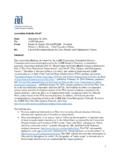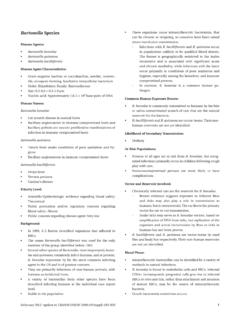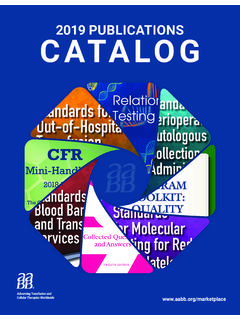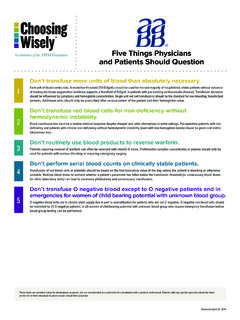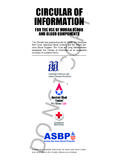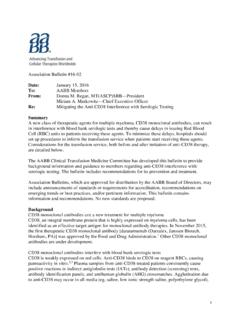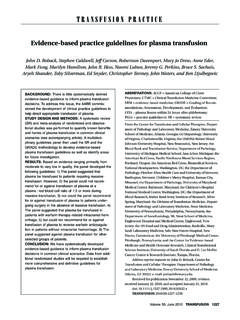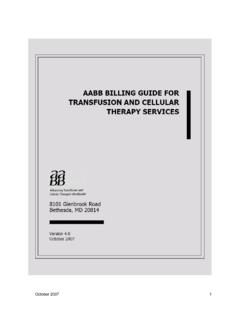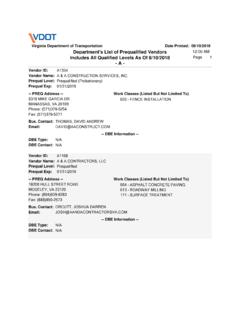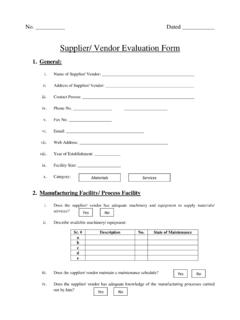Transcription of Vendor Qualification Plan FAQ
1 Vendor Qualification Frequently Asked Questions Developed by the AABB subsection: Cellular Therapies Quality Operations June 6, 2011 We would like to acknowledge the participation of the following contributors to this document: Diane Kadidlo, Enrique Alvarez, Kathy Fortune, Meng Kee Tan, and Sallie Allman. Disclaimer: This document is not intended to replace a thorough review of source materials including the Standards and is not endorsed by the AABB Cellular Therapies Standard Program Unit or the Accreditation Program Unit. The document was prepared as a template by volunteer members as a tool for other members and is not intended to be all-inclusive. Each facility should perform its own risk analysis as it develops a quality system. Each facility will have to evaluate its own practices and decide what steps are necessary, based on its own risks.
2 How do I ensure compliance with the audits? Work with your Vendor contacts to clarify any concerns or findings following a Vendor assessment/audit. If the Vendor is not responding to your inquiries, do you have a qualified secondary Vendor option? Monitor deviations or complaints pertaining to the product or services provided by the Vendor . Define a threshold by supplier criticality that would trigger an investigation or action on your part. Use information as part of re-audit for a Vendor . Are the numbers acceptable? Has the Vendor been responsive to reports? Etc. Whom should I use as Vendor /provider contact ? This question should be considered from two separate perspectives. Your facility should establish a contact on the Vendor side that would be most suitable to answer your quality questions.
3 Depending on the nature of the Vendor (supplies, equipment or services), the contact may be an account representative or a quality counterpart to your organization. Establishing contact with multiple individuals will ensure that someone on the Vendor side is always available to respond to your inquiries. In the same way, your organization should create a system that includes multiple contacts within your facility to ensure that should someone leave your organization, or be out of the office, a critical Vendor notification would be received in a timely manner. How often do I conduct the audits? Use a risk assessment approach to determining how critical the Vendor s supply or service is to your process. Determine as part of your process, for each level of criticality, the frequency of the audits.
4 Additionally, it is recommended that the depth, breadth and indicators that may trigger a re-evaluation are established to increase the agility of your organization when responding to variances. A risk-based approach is recommended. The more critical the Vendor s supply or service is to your process, the more intense your assessment. Consult your critical supply and equipment list when defining the possible candidates to When should I perform an on-site audit? receive an on-site audit. Additional consideration has to be paid to the practical aspects of conducting an on-site audit. In cases where the audit is deemed essential and the provider is international or far removed from the immediate vicinity of your facility, you may try to combine a Vendor audit with other business-related trips that may accomplish more than one goal.
5 Still, on-site audits may not be feasible from a time or financial standpoint. In these cases, you may need to: Perform a more detailed desk assessment or increase the frequency of the audits. Increase your specifications/requirement, : appropriate accreditation for the service/supply (ISO, AABB, ASHI, etc) Do service providers need to meet specific accreditation requirements? In cases where the specification or requirement is critical to the supply or service that is provided, and service or supply directly affects the safety, purity, potency or quality of your product accreditation requirements should be evaluated by your company. The way of ensuring compliance with accreditation requirements may not be as straight forward as just checking if the Vendor has a particular accreditation or membership.
6 In cases where a provider is not accredited by a recognized organization, you may need to evaluate their compliance by means of your own audit. Some services such as infectious disease testing, may have regulatory or accreditation requirements that require CLIA certifications or US FDA registration. If this is the case, you may request copy of CLIA certification and/or FDA registration. In addition, due to the critical nature of infectious disease testing, it is recommended that one review the service provider ( Vendor s) testing procedures to ensure compliance with manufacturer s instructions and current testing requirements. Can I ask about FDA Recalls, Letters or Actions? Yes, you can. Also, ask about the Vendor s responses and the current status of any actions by regulatory agencies, when applicable.
7 As part of your Vendor Qualification or periodic re- Qualification , you may also query the FDA website for recall actions and warning letters pertaining to a Vendor . How do I respond if a Vendor cites Confidentiality regarding the audit? Your request to the Vendor should always indicate that the audits are a regulatory/accreditation requirement of your organization, and that the results will be used to establish your facility s internal ability to meet standards of practice. The Vendor should explain why answering your request is a breach of confidentiality for them. At that point, you will need to assess if you accept Confidentiality as an appropriate response for denying your audit s request, and if such denial constitutes an action that disqualifies the Vendor . That said, a change of approach may be beneficial to both parties: Can you restate your question?
8 For example: You ask to see actual audit reports and a Vendor cites confidentiality restrictions. Would an audit schedule be enough evidence of an audit program? Usually, the regulatory or accreditation burden is whether audit system is in place, not necessarily the sharing of results of the assessments. On the other hand, you need to ask yourself: One might be concerned and view this as an indication of the Vendor s customer service practices, which should be part of your assessment. The recommendation is to establish a plan before the circumstance presents itself, so that your audit process is not delayed by unexpected responses. Does every supply have to have an expiry date ? No. In cases where a Vendor does not assign an expiry date, most regulatory or accreditation requirements call for your organization to make a determination of how you will use the product on an individual basis.
9 Do I have to qualify every supply, Vendor and service provider? No. Use a risk based approach to determine which vendors and service providers to qualify, how frequently and how in-depth an assessment to perform. A critical Vendor performing a manufacturing step may need to be assessed with an on-site audit annually, while others may be performed using a desk (documentation) assessment with less frequency. Vendors of a non-critical supply may never be formally assessed, other than the establishment of a product specification sheet to be used by inventory staff when receiving product into your facility. Once initially qualified, how do I maintain Vendor Qualification ? After initial Qualification , your organization should establish an audit schedule that will ensure the periodic assessment of your Vendor in order to determine if any changes in provision or service have occurred, that may affect your products.
10 The frequency of the re-audits should be established based on several aspects: The critical nature of the supply or service in relationship to your products. The frequency of Vendor service or manufacturing SOP changes. Any changes in Vendor ownership. Monitoring of deviations and complaints by setting an internal threshold that would trigger an investigation or action on your part. Can I ask about Customer References? Yes. Most reputable vendors use customer references as a selling tool and are happy to share the contact information, in some cases even boasting about their client lists. Another way to get references is from your colleagues in the field whom are usually very candid about their experiences with Vendor /suppliers. Networking within the industry can give you valuable insight into how the particular Vendor is perceived by other customers, their competitors, and critics.

